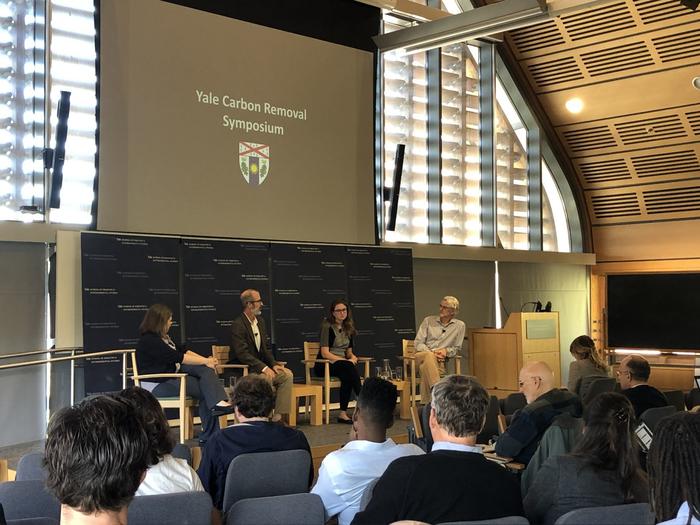Yale Carbon Removal Symposium Highlights Opportunities and Barriers for Climate Change Mitigation
Leaders in science, policy, and business gathered on October 4 at the Yale School of Forestry and Environmental Studies (FES) to discuss and debate pathways for removing carbon dioxide from the atmosphere. The event was co-hosted by the Climate Change Learning Community, Climate Change SIG, the Yale Center for Business and the Environment, Tsai Center for Innovative Thinking, and Carbon 180.
Most climate change mitigation scenarios in the IPCC Global Warming of 1.5 Degree Special Report rely on some form of carbon removal. While the concept of removing carbon from the atmosphere seems to be a potentially critical step in meeting our climate goals, there is a lot of uncertainty around this practice, including cost, scalability, equity considerations, and even moral concerns. The Carbon Symposium provided a space to explore the feasibility of carbon removal, as well as its policy, economic, and philosophical implications.

Nature-based solutions panel
To explore the different aspects of carbon removal, the symposium was divided into three sections: nature-based solutions, engineered processes, and business opportunities. Nature-based solutions involve maximizing carbon sequestration by natural and working lands through protection, improved management, and restoration of these lands. Engineered processes are technological advances that would allow humans to directly capture and store carbon from the atmosphere, whether by direct air capture, carbon capture at a generating plant, or through advanced weathering. Business opportunities include private companies that have identified for-profit models for carbon removal.
The nature-based solutions panel featured Bronson Griscom of Conservation International, Emily Landis of The Nature Conservancy, and Emily Cole of American Farmland Trust. Bronson Griscom described the significant potential of improved management of working landscapes to remove carbon, as well as the importance of conservation and restoration of natural cover. Emily Landis focused the conversation on blue carbon, the potential of coastal and marine ecosystems to extract carbon naturally from the atmosphere. Emily Cole gave an overview of agricultural best practices to improve soil health and enhance natural carbon sequestration while emphasizing the importance of working with farmers on climate mitigation and adaptation efforts.
The engineered processes panel featured Kelly Levin of World Resources Institute, Peter Psarras of Worcester Polytechnic Institute, and Peter Keleman of Columbia University. The panelists discussed the different techniques of carbon removal, including direct air capture, carbon capture and storage, and geologic solutions. Significant barriers to deployment of these technologies at scale remain, including significant energy and resource requirements, as well as prohibitively high costs.

Etosha Cave on the business panel
The business panel included business leaders on the forefront of carbon removal technologies. Panelists were Olga Baker of Indigo Ag, Etosha Cave of Opus 12, Graciela Chichilnisky of Global Thermostat, and Andy Ruff of Gray Organschi Architecture. Each of the panelists highlighted how innovation in the field of carbon removal continues to advance and evolve at a rapid pace. This panel translated some ideas about technology from the previous panel into opportunities to make carbon removal a potentially viable venture in today’s market.
Participants held lively conversations over lunch including a discussion of law and policy implications of carbon removal. Questions explored included: How can policies enable future funding and research of carbon removal techniques? And how much should attention should carbon removal garner when other forms of emissions reductions would have more positive co-benefits?
A sentiment voiced by Kelly Levin at the beginning of the day resonated throughout: that carbon removal is not the silver bullet that will save us from climate change. Rather, it should be one tool invested in to address the drastic reduction in emissions the global community needs if we have any chance of meeting a 1.5 degree target.
The Yale Carbon Symposium was orchestrated by Yale FES students David Paolella and YCELP’s own Maggie Ferrato.